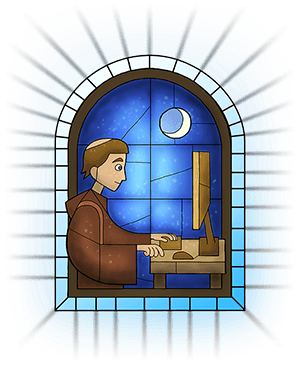Before we started making Reus, Bas and me were kind of experimenting with our capabilities. We agreed to make a few shorter games to find out where our strengths were and to measure our planning capabilities. It started out pretty good with Llamapalooza, which we made in just a few days and without real hick-ups. Things were going just as planned and we were ready to make the next game of a week or two.
Of course, awesomeness had to come and shake everything up. Someone posted the following piece of art made by Markus Wagner (Music by Matthias Hacksteiner).
We were immediately hit by that what is so important in movies and games alike, but whose place is often forgotten: the theme. The giant representing nature, the humans taking their toll on it, and the catastrophe that follows. Music, art style, narrative and fantasy, everything made sense in a grand way.
So obviously, we were like:”Hey we should totally make something like that!”, and we kind of threw away the two-weeks-game thing and started making something way to ambitious and big. Stupid inspiration always resisting planning.
If a simple theme can inspire me to spend more than a year making a game without a guarantee of success, it can probably “inspire” some folks to give me 60 euros for that game as well! (Don’t worry, that’s not actual price) Still, I was kind of surprised how quickly we all forgot it’s power. once we really got working on the game, everyone just started doing it’s own thing. Bas started up the engine, Maarten produced some fancy art and I was trying out some prototypes. Sure, we discussed some overarching things now and then, but there wasn’t any real focus. It was with the announcement of ‘Reus’ itself that the theme really came back to me. In an article on JustPressStart about Reus’s announcement, the author is fascinated by the theme and possibilities of the game. Then it hit me again: “Ow yeah, that’s right, this is why this could turn out to be awesome!”. Why does theme work so well, and what should you be doing to enforce that?
Context and Imagination
People often point toward shapeshifting clouds in the sky, saying stuff like:”Look, it’s a lion/snowman/Barbara Streissand!” When you look at those clouds with that information in mind, you start seeing things that aren’t there: eyes, arms, and all other sorts of things. It’s incredible how the human mind can fill up gaps, given that it knows what it ought to be. This is also how most optical illusions work. Well, this super assumption power is not only limited to visual things.
Think about pokemon for a second. The game has a very strong unifying theme that lies deep in the hart of many boys: battling with your collectible pet-monsters. If I would go towards a kid, and tell him: “hey, imagine that your dog Brutus can spit fire on your command to fight of evil-doers!” he would totally know what it would look like. I just gave him one sentence, and he’s probably already lost in his imagination. Pokemon uses that, and therefor, it didn’t need (or doesn’t need) fancy animations, detailed real time battle or anything like that. They just give you a picture, the name of an attack, and some modest effects. You fill in the rest, because you know what they’re talking about.
So at first it would look that themes are there to fill in the gaps and to save the lazy game developers. But this is just a side effect of what themes are in my opinion. Themes are what realize a world in the mind of the observer. You could even say that our own lives are themed by our childhood as well! You receive input, filter it through your “theme-glasses”, and model it in your mind. To do so most efficiently, your brains make up stuff that isn’t there just to make the model work. It’s magic, really Themes are even stronger when our minds deem it believable or close to reality, like the fantasy of myths, science fiction or historical drama. That’s why Psychonauts was so damn awesome:”So that’s how it looks like inside the brains of a sentient fish! Makes sense!” . To interpret input, and shape it into a model or experience in your mind, that’s the great power of a theme.
Keep focused
Our theme:

blog comments powered by Disqus